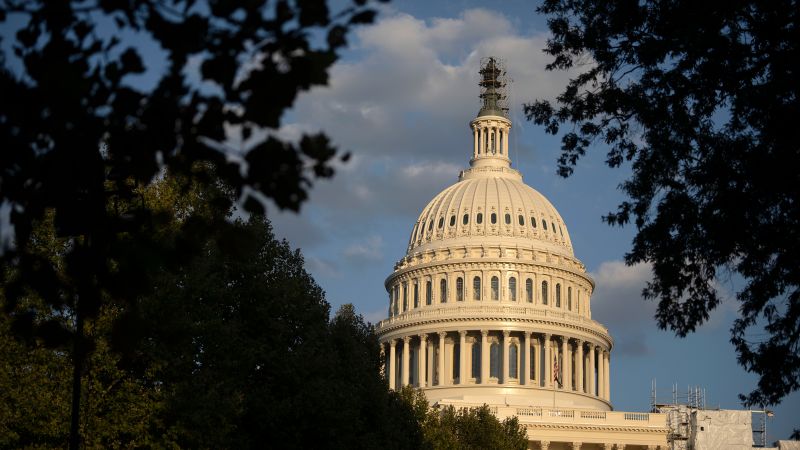Goldman Sachs warns that a US government shutdown is likely to occur in 2023 due to lawmakers' failure to agree on a budget, which could negatively impact stocks and economic growth.
The far-right House Freedom Caucus is poised to cause a government shutdown at the end of September by insisting on unlikely provisions in exchange for its votes to fund the government.
The potential government shutdown threatens to deprive the Federal Reserve of crucial data on the labor market and inflation, which could hinder its ability to make informed decisions about the economy and interest rates.
Senate Minority Leader Mitch McConnell warns House Republicans that a government shutdown would be detrimental to the Republican Party both politically and in terms of policy change.
The White House warns that a government shutdown at the end of the month could have damaging consequences for the economy, national security, and the American public.
A full government shutdown in the US is likely at the end of the month, which could impact the Federal Reserve's decision to raise interest rates in November, according to analysts at PIMCO.
With just over a week until Congress hits their deadline, the possibility of a government shutdown grows as House Republicans remain divided on spending negotiations.
Congress faces the risk of a government shutdown as Republican infighting and dysfunction threaten to derail funding, highlighting the long-running chaos and dysfunction in American politics.
The US government faces a potential shutdown if Congress fails to agree on funding past September 30, which would be the first shutdown since December 2018 and could result in a longer standoff between parties.
Millions of federal employees and military personnel face the prospect of a government shutdown, which would result in financial hardships for American families, disruptions in services, and potential harm to the economy.
The White House is preparing federal agencies for a potential shutdown as House Republicans fail to come up with a plan to keep the government funded, risking disruptions to federal services and negatively impacting the U.S. economy.
The federal government is likely to face a shutdown that will affect various services, disrupt workers' pay, and create political turmoil as Republicans demand deep spending cuts.
Lawmakers are preparing for a possible government shutdown as President Joe Biden's administration advises agencies to update their shutdown plans, while congressional Republicans debate on how to proceed before the current spending plan expires.
Google searches about the potential government shutdown in the US are increasing, with a particular interest in how it would affect Social Security, veterans' benefits, and the US dollar.
A government shutdown in the US may cause the Federal Reserve to delay an interest rate hike and could impact the recent strength of the dollar, analysts have warned. The shutdown could also lead to a delay in key inflation data, which would affect Fed policy decisions, and may put pressure on consumer spending.
The federal government is on the verge of a shutdown, with potential consequences for various areas of governance.
A potential government shutdown looms as Congress struggles to pass a funding bill by Saturday night, which could result in federal workers going without pay and essential services continuing while non-essential services halt.
Federal workers are bracing for another potential government shutdown, which not only tests their financial stability but also their commitment to public service.
The House and Senate are holding crucial votes to prevent a government shutdown at the end of the week, with disagreements between lawmakers over spending bills causing a divide, particularly among House Republicans.
The Senate has passed a bipartisan bill to extend funding and prevent a government shutdown, although it may not be sufficient to avoid a shutdown entirely.
Federal agencies are warning their workers of a possible government shutdown, where employees may not receive pay, if Congress fails to reach a funding deal by the end of September 30th.
The Senate voted 76-22 to keep a six-week government funding measure on track to pass this weekend, but it looks increasingly likely the federal government will shut down when funding runs out Saturday.
Congress is facing a potential government shutdown as the Republican-led House and Democratic-controlled Senate struggle to reach a short-term funding agreement before the looming deadline.
A government shutdown due to a short-term spending bill will cause financial hardship for federal employees and contractors, but there are steps they can take such as contacting their landlord or mortgage loan servicer for assistance.
Summarizing the text given, the US is preparing for a government shutdown as the funding deadline approaches, with potential consequences including delays in work authorizations for migrants, impacts on the Federal Aviation Administration, uncertainty in the House regarding a procedural vote, and concerns about the effects on small businesses and border security.
A government shutdown is looming as lawmakers have until the end of the day Saturday to reach a deal or the U.S. will face one of the largest government shutdowns in history, impacting millions of workers and services.
Congress remains on track to trigger a government shutdown, as House Speaker Kevin McCarthy faces resistance from hardline conservatives and fails to advance a stopgap bill to extend government funding past a critical deadline.
The government is on the brink of a shutdown because Congress has not passed the necessary spending bills, and it remains uncertain how it will reopen as there is a disagreement over spending between right-wing Republicans and the Senate and White House controlled by Democrats.
The U.S. government is on track to shut down at 12:01 a.m. on October 1 unless lawmakers pass a continuing resolution or federal budget by September 30, and the biggest obstacle to reaching an agreement lies with a small group of House conservatives who are demanding deep spending cuts that won't pass the Democratic-controlled Senate.
Congress passes a short-term spending bill to avert a government shutdown, which President Biden signed into law, funding the government through November 17.
